INVESTIGATION: Poorly executed classroom projects force children out of school in Niger State
Once a vibrant hub of learning for pupils, Kodo Primary School now resonates a stark contrast to its former days when it used to record over 500 pupils enrolment with elevated staff ethics.
Located in Bosso Local Government of Niger State, the school was built by the community in 1976 and later taken over by the government to meet high-quality standards. Yet, it has suffered neglect of underfunding and understaffing over the years.
Its classrooms have become all-dilapidated, Its pupils now sit on bare floors under cracked walls and blown-off roofs to learn.
The school has no nursery section due to inadequate classrooms to accommodate pupils while structures for primary three and six have collapsed, rendering them non-existent.
Kodo is not alone, other primary schools in the Bosso/Paikoro federal constituency, are in this state; yawning for government attention. Pmasi, Chimbi, and Bwafiyi primary schools experienced a significant decline in pupils enrollment as a result of their deteriorated classrooms.
The challenge of deteriorated infrastructures and lack of provision for learning had put off the flame of quality learning in the schools and facilitated parents’ disinterest to enroll their children into schools.
The challenge of deteriorated infrastructures and lack of provision for learning had put off the flame of quality learning in the schools and facilitated parents’ disinterest to enroll their children into schools.
For fear of a possible collapse of the remaining few still-standing classrooms, many parents have withdrawn their children from these schools.
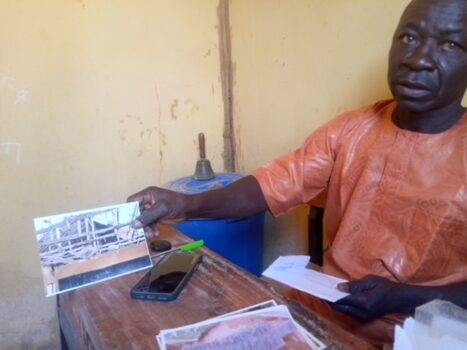
Mr Abubakar, Headmaster of Kodo Primary School lamenting the dilapidated condition of the school
Photo Credit: Abubakar Abdulrasheed
In 2022, the United Nations Educational, Scientific and Cultural Organisation (UNESCO) announced that the number of out-of-school children in Nigeria had climbed to 20 million. Although there’s no latest data on the percentage of this number from Niger State, past records show that up to 700,000 children in the state may be out of school.
Ibrahim Abdullahi, a 58-year-old farmer in Kodo community desired quality education for his children, but due to concerns about a possible collapse of the school structures, he withdrew his two children from Kodo school to a primary school in Beji town. Going to Beji takes up to 20 minutes by car.
“The community has been the one maintaining the infrastructures to keep them safe for the pupils. We used to contribute money to patch the cracked walls, repair the blown-off roofs, and even give them some planks to sit on,” Mr Abdullahi said.
He further explained that the decay had become so severe that the community could no longer afford the repairs and maintenance.
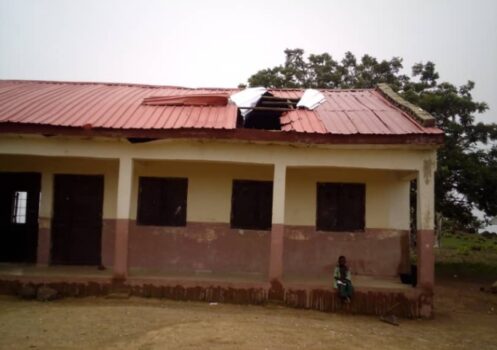
Blown off roof of classsom building at Bwafiyi Primary School. Photo Credit: Abubakar Abdulrasheed
“That is why I went to withdraw both my children from the school because those classrooms can collapse anytime, and even when it is raining, no safe place for the pupils to hide.” Mr Abdullahi added.
However, two projects which ought to save the schools were poorly executed.
Poorly executed projects
Just when all the schools had fallen into a near-extinct state, two constituency classroom projects were initiated to give a face-lift four to schools in the two local government areas of the constituency.
Earmarked in 2020, the former lawmaker representing Bosso/Paikoro federal constituency of Niger State, Sheu Barwa, nominated two classroom projects, to construct a block of three classrooms each in two schools in each local government of the constituency, Bosso and Paikoro LGAs.
Cumulatively, N68 million was allocated for the two projects and was assigned to the Border Community Development Agency (BCDA).
However, constructions in Bosso LGA were awarded to Zeppelin International Concepts Limited at N39 million while those in Paikoro were awarded to Simdi West Africa Limited at N29 million.
A document UDEME received from the Office of the Accountant-General of the Federation stated that all constituency projects for that year had been fully funded.
The beneficiary schools in Bosso Local Government Area are Kodo and Pmasi Primary Schools, while Chimbi and Bwafiyi Primary Schools benefited from the one for Paikoro Local Government Area.
When this reporter visited these schools in July, it was observed that the projects were poorly executed as all the classrooms buildings were cracked with their roofs leaking or blown off, while their furniture had broken.
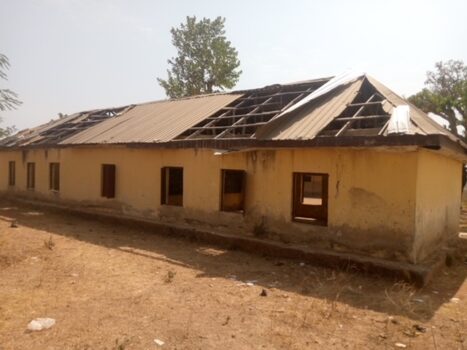
Dilapidated existing classrooms at Kodo Primary School.
Photo Credit: Abubakar Abdulrasheed
The poor execution of the projects does not still allow the schools to function in full capacities as in their glory days.
Parents and staff of the schools said their initial joy for the projects was soon replaced with disappointments as the buildings began to deteriorate, returning the schools to their former state of disrepair.
Usman Abubakar, the headmaster of Kodo said they started using the classrooms towards the end of the year 2022 and the facilities, including the building and furniture were getting destroyed due to bad quality.
READ ALSO:INVESTIGATION: Failed multi-million naira constituency water projects litter Sokoto communities
“We didn’t even know the contractor, they used to come and work during weekends and holidays. It was abandoned many times before they completed it. It was even under lock for a year before they supplied us with furniture. I heard other beneficiary schools also experienced the same.
“When there’s no classroom for us to use again, we broke the keys and moved into the building. The classrooms were even leaking when we moved in.” Mr Abubakar said.
He added that they couldn’t conduct the third term examination before they went on holiday because the roof had been blown off and there was consistent rainfall and almost all the furniture had broken down due to poor make.
“All our existing classrooms have become dilapidated and no longer in use. Now, this one we hoped would save us has also become dilapidated. Our enrollment has reduced so badly. Before, we did have over 500 pupils but it has reduced to about 100 pupils now. Many pupils have stopped coming to school or have been withdrawn to another school”, he added
The Kodo village head, Muhammad Musa, said the poor construction has not yet rescued the school from its dire infrastructure conditions. He noted that rain forces school closures due to leaky roofs of the building.
“What makes it different when the new construction is not done well and pupils still sit on the floor? Whenever the rain is set they have to close from school that day because of the leaking roofs and part that has been blown off”, Mr Musa expressed.
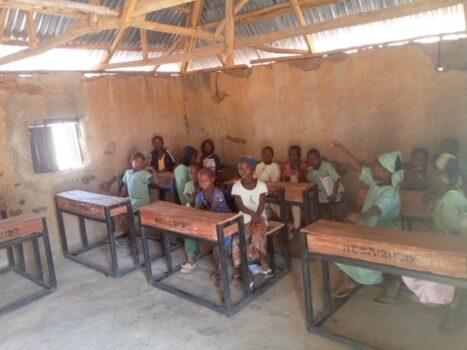
Bwafiyi Primary School now rely on their old classrooms due to consistent leaking of the new constructed classrooms
Photo Credit: Abubakar Abdulrasheed
The stories in other beneficiary schools were not far from what were found in Kodo. Despite the projects, all the schools continue to long for the restoration of the quality infrastructure they once possessed.
At Bwafiyi primary school, only a classroom is in use, others are leaking and the furniture supplied have broken.
The headmaster of the school, Bincent Iliya, said they had to merge pupils of the school into the two classrooms they were using before the project, while primary two and three were merged in a classroom provided by the project.
“No classroom from the government since 2003 they established the school. This is the only block of two small classrooms we have and was built by community efforts. When they came to build this for us, we hoped we’d have more classrooms for our pupils but due to poor construction, we can no longer use it because it is always leaking.
“There was a time when the rainstorm blew off the entire roof when we’ve not even started using it. They came to repair it but yet it is still leaking. You can also see that the furniture they gave us has broken, many of the pupils still have to sit on the floor”, Mr Iliya said.
He also laments the lack of specifications for the project, noting they don’t have any office for the teachers. The headmaster and teachers use a shed provided by a tree as an office, as the project provided none.
Former local government chairman reacts
Abubakar Gomna, the former Bosso local government chairman, told UDEME that he was unaware of the project executions despite being the chairman at the time the projects were executed.
“I can authoritatively tell you that, at the onset of the construction, they didn’t inform us at the local government authority, which is the closest to the masses,” he said.
Speaking on behalf of his principal, Sanusi Salihu, the secretary to Mr Barwa admitted that there was poor execution of the projects by the contractors.
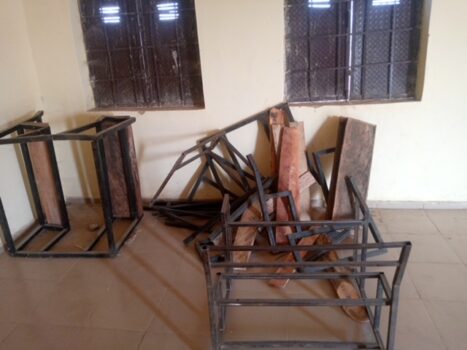
Substandard broken furniture supplied to Chimbi Primary School
Photo Credit: Abubakar Abdulrasheed
“Contractors even disappointed us. All those places you visited, all those structures are not even good to our standards. If you see how I was fighting with the contractor, I had to involve the executive secretary of that agency before those projects were completed.
“When those projects were ongoing, I received complaint letters with pictures of poor implementations from the communities and the schools. He collected money and abandoned our sites. As at the time he was being pressured to complete the projects he didn’t have money, he was now looking for ways to do the project by sub-contracting it to someone. Look at the standard of the work, you’ll think they are community efforts,” Mr Salihu said.
An FOI response received from the BCDA revealed some specifications for the projects which the contractors failed to meet, like standard size specifications and electrical service features.
To ascertain concerns of poor execution, a call was made to a staff of the agency who preferred to speak under condition of anonymity. The staff stated that the total contract amounts for both projects were initially released to the contractors but part of that was later refunded to the government’s account following an investigation by the Independent Corrupt Practices Commission (ICPC).
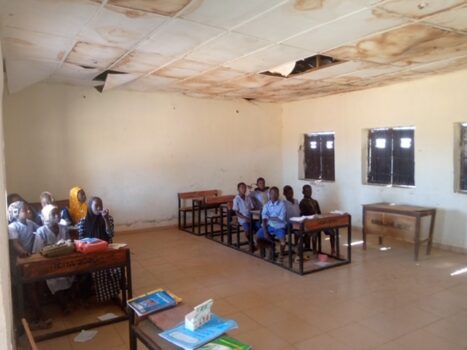
Leaking roof at Kodo Primary School
Photo Credit: Abubakar Abdulrasheed
He said the commission had revealed disparities in the project executions and a lack required qualities and specifications.
“My knowledge about those projects after handing over; there was a time, you know ICPC do this tracking of projets, they went to the sites and they complained about some things like substandard work and lack of qualities. They compelled the contractors to make some refunds back to the government, and which was done.”
However, he couldn’t ascertain how much was refunded by the contractors.
Investigation rebealed that both companies, Zeppelin International Concepts Limited, and Simdi West Africa Limited were probably being managed by the same people. Letters of inquiry sent were recieved by the same person, Obasi Edna, who claimed to be the secretary for both.
When contacted she admitted that both companies are controlled by the same people.
Reacting to the poor execution of the projects, she blamed the schools for poor maintenance of the buildings.
“They were the ones that spoiled everything. Since 2020 till now, are we supposed to go back? We already completed the project,” she said.
By Abubakar Abdulrasheed.
This report was produced under the UDEME project of the Centre for Journalism Innovation and DevelopmentI(CJID).



